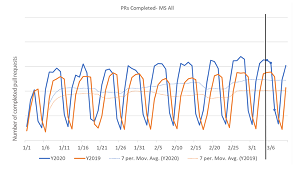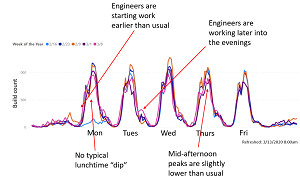News
Remote Development Productivity at Microsoft: 'No Lunchtime Dip'
If you're an enterprise developer, welcome to the new order in the age of COVID-19. In other words, get used to working from home, possibly even after the virus burns out.
So what happens when an enterprise shifts its software development to a remote, work-from-home scheme?
Microsoft mined its internal data to find out, noting engineers are starting to work earlier than usual and working later into the evenings. What's more, there's no typical "lunchtime dip" in production and mid-afternoon peaks are slightly lower than usual.
Those observations stem from measuring "builds per engineer per hour" in Microsoft's Office Engineering organization.
The results of the internal study were shared last Friday in a post titled "Helping our developers stay productive while working remotely" penned by Microsoft 365 exec Jared Spataro, who turned the floor over to Aleš Holeček to discuss the productivity data.
"Like you, we're learning as we go," Holeček said. "However, we are heartened by an early look at the numbers relating to engineering productivity during this period of remote-first work. Across Microsoft, we are tracking the number of times engineers submitted changes to the computer code the company uses -- a proxy for productivity."
A look at how company-wide completed pull requests were trending showed no letup in productivity.
 [Click on image for larger view.] Trend of Completed Pull Requests Company-Wide. (source: Microsoft).
[Click on image for larger view.] Trend of Completed Pull Requests Company-Wide. (source: Microsoft).
"Across work items, commits, and pull requests, we're not seeing any declines," Holeček said. "If anything has changed, it's a shift in activity during the day, with activity starting earlier and finishing later, and with lower 'peaks' in the middle of the day."
 [Click on image for larger view.] Builds Per Engineer Per Hour -- Office Engineering Organization. (source: Microsoft).
[Click on image for larger view.] Builds Per Engineer Per Hour -- Office Engineering Organization. (source: Microsoft).
The post also shares how Microsoft is helping its remote developers by encouraging team culture, keeping developers informed and pointing to remote work resources, along with optimizing remote setups for engineers with proper tools and processes.
"Enabling a team to work remotely is an ongoing challenge, and we understand that this challenge is different for every organization," Holeček said. "We have found that maintaining a collaborative and productive culture, empowering devs with remote-friendly tools, and watching the numbers to ensure we stay productive are all effective ways to help our engineering team move to remote work. As more organizations transition to remote work, we will keep sharing best practices, success stories, and tips to help make it a seamless, successful experience for everyone."
About the Author
David Ramel is an editor and writer at Converge 360.